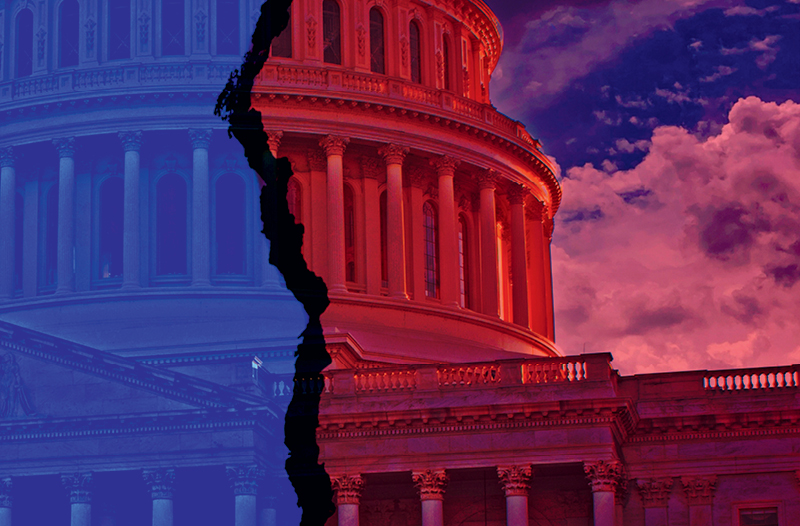
Making Sense of Something

Each year we ask our intrepid lobbyists, Joel and Joel (that’s Wood and Kopperud to most of you), to take up their partisan cudgels and defend their passions, explain their political visions and give us some clarity about our industry’s political future (i.e., what the hell is Washington doing to us now). This is their latest salvo, via traceable emails, of course (this is Washington, after all). —Editor
From: Joel Wood
Sent: Wednesday, January 03, 2018 10:50 AM
To: Joel Kopperud
Subject: Don’t Tell My Wife
So, Joel, what to say? It’s not the year that either of us expected. I always think back to election night. We had 75 or so brokers in town (for a MarshBerry conference), and we were hosting an election watch party in our offices overlooking Pennsylvania Avenue. I love you, but I don’t like being around Democrats on election night, as I feel it’s the one night every couple of years when you need to be with your own people. You started pacing early, after Florida and North Carolina and the early Rust Belt returns. I was very happy that the Senate races were looking really good for Republicans but serene in my knowledge that, when Detroit, Milwaukee and Philadelphia results came in, the race would be called for Hillary. When I left at 11, you had the look of that guy at the bottom of the human pyramid at Abu Ghraib, but I still felt like your party was going to win. Hell, I even laid down a thousand bucks on Hillary on some Vegas website from the back of my Uber on the way home (my wife still doesn’t know that). That all seems eons ago.
From: Joel Kopperud <[email protected]>
Sent: Wednesday, January 03, 2018 4:48 PM
To: Joel Wood <[email protected]>
Subject: Still Feeling the Pain
Ugh. Yeah. No offense, but last year sucked. I do my best to not relive that moment. I vividly remember waking up the next morning, turning on my shower, and thinking to myself, “Oh, I still have hot water. That’s good.” LOL. Those following weeks were hard, to say the least. Ever since the “All Dressed Up and Nowhere To Go” party that Blue Dog PAC Chair Kyrsten Sinema hosted for the few Democrats who stayed in town for the inauguration, most of the noise in my circles has been dark. And a lot of us have turned our angst and frustration inward within our own party ranks, looking for new energy and enthusiasm. I go back and forth on the blame, but a status quo approach for Democrats sure doesn’t feel right.
You know there wasn’t a stronger Hillary supporter than me. She lost by 79,000 votes in the states that matter. (138 million were cast. And, BTW, we need to get rid of the Electoral College. She won the popular vote by three million.) If only one of the MANY things didn’t go wrong in the campaign, she would be president—i.e., Russia, Comey letters to Congress days before the election, misogyny…But it should have never been that close to begin with. At the end of the day, it was the candidate and the campaign. Every election is about “the economy, stupid.” It’s always about kitchen table issues. I hope Democrats remember that in 2018. I don’t think Donald Trump and this Congress have done a lot on kitchen table issues for the average American. Yeah, I know, tax reform—that will be a flash in the pan—and the impact it’s gonna have on insurance premiums will negate any tax relief for the average American. Everyone supported tax reform before the election, and congressional Democrats and Republicans were gearing up for a comprehensive package for the Clinton administration to sign. It just would have looked very different from this one…That bill should be good fodder for Democrats, if we can message it right.
That said, our members didn’t do too bad in all of last year’s chaos, considering the threats to employer-sponsored insurance. But there were some questionable deals cut in tax reform on pass-throughs, and if the individual health insurance markets and policies careen off the edge here, we could be in trouble. Ya know, we should have another vote to replace the ACA. Ha ha ha. Just kidding. How about one to finally repeal the Cadillac tax???? Not kidding.
From: Joel Wood
Sent: Thursday, January 04, 2018 6:32 PM
To: Joel Kopperud <[email protected]>
Subject: Losers and Winners
Wow, you certainly still have a lot of angst going. Sure, let’s give up the Electoral College so that New York and California can pick our presidents? Bad enough that we have a cold civil war on our hands right now…that would be more than cold.
But, there, you got it out of your system, now let’s talk about commercial insurance brokerage and what this presidency/Congress mean. Overshadowing everything, as you note, is the tax reform law. Where you stand depends on where you sit. On the big-picture, unifying issues of our association—preservation of the employer exclusion for group insurance from taxation and continued ability for our member firms to continue to amortize intangible assets—we had good wins, and I feel that we were able to move the dial in the process. Our non-foreign-domiciled C Corporations, too, were big winners, to the extent that many paid high marginal effective tax rates.
For the many firms of our association structured as pass-throughs, Congress did them no favors. The congressional tax writers—a really small, insular, non-transparent group of them working and reworking the entire tax code in the space of only a few weeks—consciously chose to pick winners and losers among the pass-through organizations. They granted significant relief to manufacturing firms and very small businesses, while segregating everyone else into a “services” category that got no relief.
On the one hand, politically, I get it. To give a new low rate to every pass-through would have required finding hundreds of billions of dollars elsewhere in the tax code to save. And politically, their purpose was always to lower the corporate rates, to get repatriation, to advantage American corporations. Part of the political calculus was aimed at manufacturing jobs, and small businesses had to get their slice of relief since major corporations certainly were. But intellectually and substantively, it was wrong to pick winners and losers in this way. This was especially underscored by the carve-out the architects and engineering firms got from the “services” definition by glomming on to the manufacturing sector. I’m sure this is what you’re referring to as “questionable deals” in the tax law. They may not have been dirty deals, but they’re not fair to everyone in the “services” world left in the lurch.
I talked to one of our executives today from a major pass-through-structured firm in the Midwest. The overwhelming majority of his clients are manufacturers, and most of them are pass-throughs. They get relief; he doesn’t. Why should that be? The result is that many firms are now facing the glaring and potentially jarring incentive to convert to corporate status to take advantage of the top corporate rate of 20%. On top of that, the limitations on entertainment expensing and other provisions wind up meaning that many of our member firms receive a net negative benefit from the law. (I’m betting the entertainment expensing is going to create a backlash that GOP leaders didn’t expect and may well regret.)
Said our Midwest exec to me as we completed our call: “I hope there’s a blizzard in Washington and you burn all my tax dollars to keep warm.” I don’t blame him.
Also, private-equity backed firms—an ever-increasing presence in commercial brokerage—got slapped with major new provisions limiting debt financing. The final provisions have a phase-in and aren’t as onerous as some promoted, but they’re still a challenge for those firms.
For me, a lowly House staffer 32 years ago when the last big tax bill was passed, I understand the politics, but I hated the process. After the epic ACA repeal/replace fail, GOP leaders had to pass tax reform. They had to do it, even though public approval for the package was low. The consequences of failure were unimaginable to all of the friends I have in the GOP leadership and rank and file.
I intellectually understand given the polarization of the country and the Congress, an open, bipartisan, extended process like 1986 would not have succeeded. I just think there’s going to be a lot of cleanup needed, and there are going to be a lot of unanticipated distortions in the economy.
From: Joel Kopperud
Sent: Thursday, January 04, 2018 7:14 PM
To: Joel Wood <[email protected]>
Subject: Warms My Heart!
Thank you, professor. A lot of cleanup, indeed. I was reading an interesting blurb in one of the Hill rags that the real winners in tax reform were lobbyists like us, who would be stuck trying to fix the law for years. #draintheswamp
Hill staff warned me a few weeks ago that there’s going to be a lot of FATCA issues popping up because of this bill, too. Of course there are—and that really concerns me! I was hoping our next big victory would be finally clarifying that p-c premium payments are excluded from FATCA. Sen. Tim Scott, D-S.C., is following our champs in the House (Reps. John Larson, D-Conn., and Jason Smith, R-Mo.) and doing a lot of good work to get this clarification. We’ve been working on this for years, and we’re the closest we’ve ever been. Our challenge has always been the process, not the substance. And the last administration essentially said, “We don’t have enough resources” to fix your issue, considering our niche issue was at the bottom of their FATCA to-do list. We finally have their attention on it. Now, we just have to get it done and hope the barrage of other FATCA issues doesn’t smother us again.
You also forgot to mention the repeal of the individual mandate and the fate of the ACA taxes and employer mandate penalties. We all know the threat that repealing the mandate poses to premiums. It will be interesting to see if 13 million Americans throw up their hands on insurance, as the Joint Committee on Taxation predicts, and how that affects premiums on employer-sponsored coverage. There was also a move at the end of the year to delay enforcement of the mandate penalties. I’m hearing a lot of our members’ clients are getting some really steep penalties for some potentially inaccurate but innocuous reporting. We’ll be supporting congressional efforts to fix this problem.
Of course, our biggest beef here is still with the Cadillac tax. The $87 billion pay-for is still the major holdup, but they almost delayed the tax to 2021, which was a good move—even though 2022 would have been better. The momentum to repeal the health insurance tax is real. We need to get on that bandwagon. It is a demonstrable minority in Congress that support the Cadillac tax. We need to get our champions unified and rallied. It’s not easy for all kinds of reasons, but we’re coming down to the wire again.
The war on drug pricing and against PBMs is heating up again. I’m gonna keep my mouth shut on that right now, but it’s gonna be a battle I’ll be paying close attention to.
BTW, did you see that control of the Virginia General Assembly was determined by a random drawing? You guys won, but wow, what an election down ballot in a purple state. And we swore in a new Democratic Senator from Alabama this year. I think we’re all cautiously optimistic we might actually right this ship in November. I love hearing Sen. Mitch McConnell, R-Ky., make noise about how bipartisan we’re going to be. Warms my heart!
From: Joel Wood
Sent: Friday, January 05, 2018 8:32 AM
To: Joel Kopperud <[email protected]>
Subject: Not Going to Happen
Somehow I knew you’d pivot from pass-through tax discrimination to the issue of an exurb/rural Virginia House district electing a transgender Democrat over a right-wing Republican incumbent. And sorry you lost that coin-toss, too.
Your political enthusiasm is justified according to history—parties out of power win in off-season elections, and Trump’s popularity wanes. But you’re looking at a map that’s not friendly to Democrats in either the House or the Senate; the Dow crossed 25,000; employment levels soared; and the corporate tax cut along with repatriation could give the economy some sizzle. What do we know?
What I DO know is this—Democrats’ retaking control of the House and Senate isn’t good on the benefits front. Bernie Sanders has been introducing his single-payer bill forever, and nobody paid attention. The day last fall he reintroduced it, ALL of your prospective senatorial Democrats who look in the mirror and see the president of the United States—Warren, Booker, Gillibrand, Harris—were original co-sponsors. I’m no Chicken Little on this, but “Medicare for all” is pretty much the mantra of your party these days, and your left-wing “Indivisible” nuts are increasingly driving your agenda.
So, even if you’re an establishment Republican deeply skeptical of this president and you’re pissed about the tax bill, you’re likely NOT pining for Rep. Nancy Pelosi, D-Calif., and Sen. Chuck Schumer, D-N.Y., driving the agenda (though, admittedly, I do have some good stuff to say parochially about Sen. Schumer; plus, he scares me).
Finally, as to the Cadillac tax, I think brokers are doing the right thing in counseling clients to assume the tax is going to be imposed. Like DACA, Cadillac is an issue where we’ve been taken hostage. Our support is miles and miles long and yet only inches deep. The latest suggestion from House GOP leadership is that Cadillac should be repealed only in exchange for scaling back the employer deduction for group health benefits. Not. Going. To. Happen.
From: Joel Kopperud
Sent: Friday, January 05, 2018 9:32 AM
To: Joel Wood <[email protected]>
Subject: Not Feeling Great About Our Direction
Your party openly wants to tax benefits, and you’re scaring our members with single-payer alarms? Everyone knows that’s not going to happen. CBO scores the measure at $32 trillion, and every Dem I know that’s on that measure knows it will never happen. It’s messaging to the base. And my message to them is this: our focus should be on the ends, not the means. We ought to be focused on ensuring every American has good coverage. Not on how they got that coverage. That was the mantra going into the ACA, and the past eight years haven’t been nearly as disastrous as we thought. After all these repeal and replace efforts, we might wind up defending a lot of key pieces of the ACA because the employer-sponsored insurance market relies on them.
Sigh. Anyways, yes, you’re right. Taking back either chamber is still an uphill battle for Democrats. But I come back to what I said earlier about kitchen table issues. I think Trump/Bannon/Ryan/McConnell are actually doing a great job for Democrats. The challenge will be keeping candidates from getting distracted by issues that are good for their base but not the middle (Russia). Let The New York Times talk about that. We need to keep talking about healthcare and the economy. Sure, the stock market is doing great and there are jobs all over the place, but the scenario reminds me of an interview from the ’92 election, when one voter complained to a reporter, “Yeah, I know there are a lot of jobs. I’ve got three of them.” This is about economic inequality and a stagnant middle class. Wages. That was a major issue boosting Trump last year, and ironically could boomerang to help Democrats.
Democrats need 24 seats to take back the House and only two in the Senate. I could see it happening. I don’t think there are a lot of Americans feeling great about the direction of our country right now…
From: Joel Wood
Sent: Friday, January 05, 2018 9:45 AM
To: Joel Kopperud <[email protected]>
Subject: Give Me a Break!
Everybody’s only talking to people who agree with them, and we increasingly live in a world where we both physically and virtually reside with those who agree with us. We agree on that. But the readers of Leaders Edge can hear our crap on a thousand cable channels. Let’s talk about a few things affecting brokers in public policy where accord can be found.=
The National Flood Insurance Program, one way or another, is going to get reauthorized. By a vote of more than 400 (400!) in the House, a bill to incent the development of the private flood insurance marketplace was approved (by making regulators accept non-admitted paper). Some indigestion in the Senate on the private flood stuff (coming from both Ds and Rs), but there’s a good chance there.
You’re right that we’re getting close in eliminating the requirement that international p-c placements should be regulated under the Foreign Accounts Tax Compliance Act. But this isn’t horseshoes or hand grenades; close isn’t enough. The Trump administration Treasury Department has been receptive.
And the Trump administration looks prepared to finally advance a slate of directors for the National Association of Registered Agents and Brokers—a clearinghouse for nonresident agent/broker licensure that will be a boon to our members. It had bipartisan support, but the Obama administration couldn’t get a slate of directors together in two years.
You and I know many areas of bipartisan cooperation on insurance regulatory issues, and they’re not the things that get any headlines.
But give me a break on “your party openly wants to tax benefits.” Yes, Paul Ryan does, and I hate that. But when there was a provision to scale back the employer exception in the ACA debate, the overwhelming majority of rank-and-file Republicans revolted on that, and it died. It will continue to be whack-a-mole, but it’s wrong to say there’s consensus on taxing benefits among Republicans, when it’s a fact that single-payer healthcare—whether incrementally (greater threat) or all at once (less a threat)—is becoming the religion of your party.
You’ve been attending too many of those little liberal séances on Capitol Hill. Need to get out more to hear our members.
From: Joel Kopperud
Sent: Friday, January 05, 2018 1:44 PM
To: Joel Wood <[email protected]>
Subject: Fox and Friends
Ha. I’m out there, and I hear a lot of anxiety over repealing without replacing, imploding health insurance markets that are directly tied to the GOP repeal of risk corridors, cost-sharing reduction (CSR) payments and now the individual mandate. The dismantling of the ACA in this fashion is a major threat to our business. Democrats might be making a lot of noise about healthcare for all, but their mission, if they get the majority back, will be to prop up the markets. You’ll see Medicare and Medicaid buy-in options, sure, but they’re ultimately going to work to preserve Obamacare and incidentally ESI. I actually think that notion of propping up the markets could be another area for potential bipartisan support if we can get leadership off the repeal train—and it looks like they’re getting there, particularly after losing the Alabama Senate seat. The bipartisan provisions pushed for by governors of both parties—led by Kasich and Hickenlooper—is a good path toward centrist solutions, and the will behind the Alexander Murray proposals to reestablish CSR payments and provide flexibility for 1332 waivers is a good start. I’m actually optimistic on this. If not this year, then next.
And you’re right about NARAB movement. This is all positive noise we’re getting from Treasury, but it is wrong to say the Obama administration couldn’t get a slate of directors together. The administration had enough directors together for a quorum and to get the board running, but a handful of nominees, ours included, were held hostage over one Republican senator’s insistence that his former staffer get Senate confirmation to a delicate and circumstantial SEC position. A completely unrelated issue that should have never hindered our nominee. But we are moving forward now, and that’s all that matters. This is an easy area for bipartisan cooperation.
Changing direction quickly while I have you, I wanna vent a little bit about this governance style. Every major piece of legislation written in this Congress has been written by five people (slight exaggeration but a shockingly few bodies around the table), and the doors have been locked. Members of Congress have been asking us what we are hearing about the latest repeal bills—what’s in the latest tax bill, what we are hearing about government funding bills. That’s offensive. The notion that a handful of people can rewrite the nation’s tax code and health laws and force votes on it within a week with limited input from stakeholders—a scenario that actually had legislative language handwritten into the margins of the bill—is absurd and irresponsible. Every headache in our industry and across the country caused by the short-sightedness of the pass-through deal on service industries could have easily been avoided if this massive tax bill went through regular order and we had a fair chance to discuss and amend it—the way our founding fathers intended.
Our leadership can’t even figure out a way to protect American DACA citizens or to fund the Children’s Health Insurance Program. And the leader of this mess in the White House cares more about “Fox and Friends” than any of these policy solutions. Michael Wolff contends he barely reads one-page memos put into the simplest terms. I mean, how can you defend this?
From: Joel Wood
Sent: Wednesday, January 03, 2018 4:04 PM
To: Joel Kopperud <[email protected]>
Subject: Makes Sense to Me
Covfefe




